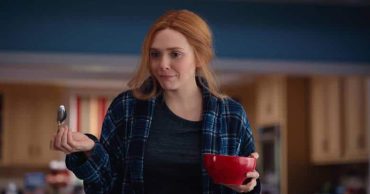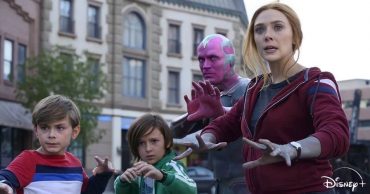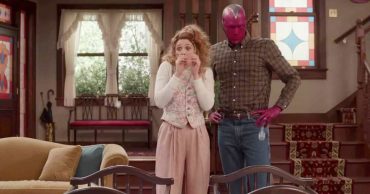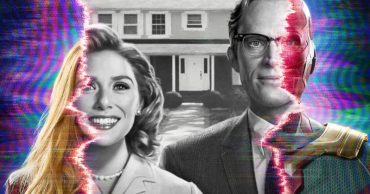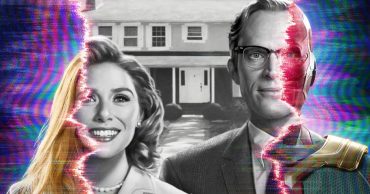MCU has always gone above and beyond with easter eggs in movies and TV shows, but the WandaVision has made things even better by parodying popular TV shows. Marvel is always exceptional in sneaking some hidden details in its series, and it didn’t hold back in WandaVision either. Whether it was a reference to previous MCU moments or classic TV sitcoms, the show covered it all. In the whole series, we see Wanda and Vision live a sitcom life that keeps developing decade by decade with every episode.
Throughout the series, both protagonists live a satirical domestic fantasy based on sitcom aesthetics. Seeing that the show has plenty of immaculate sitcom details, sitcom fanatics tend to connect the easter eggs with appropriate references. The show starts slow and makes its way to modern sitcoms by changing the tropes with each episode, which helps classify them in order. Here’s every TV show WandaVision parodied during its run.
6. WandaVision Channeled The Black And White 1950s Sitcom Theme

- Leave it to Beaver
- I Love Lucy
- The Honeymooners
- The Dick Van Dyke Show
The very first episode takes a jump far back in the timeline and starts by referring to the 1950s sitcom. The shows at that time were characterized by their nostalgic set, black-and-white photography, and costume design. WandaVision’s first episode symbolized all these factors accurately, directing its reference toward the 50’s sitcom. To be specific, the post-war domestic lifestyle of Wanda and Vision resembles classic sitcoms such as Leave it to Beaver, I Love Lucy, and The Honeymooners.
The show draws a whole lot of comedy styles similar to The Dick Van Dyke Show. In fact, recent interviews uncover that Dick Van Dyke was consulted by the creators for the first two episodes. When asked about his comedy secret, he said, “If it couldn’t happen in real life, it couldn’t happen on the show.” That is why we don’t see Vision as a supernatural robot flying around in the first episode. In fact, in the first dinner sequence, Wanda and Vision forget that Vision’s boss is coming for dinner. It portrayed the fact that they based comedy on real-life instincts instead of the characters’ superpowers.
5. 1960s Sitcom References To Magic And Identity

- Bewitched
- I Dream of Jeannie
Episode 1 had some references to 1960s sitcoms such as I Dream Of Jeannie, but episode 2 ramped up the references right from the open credits scene. The transformation of Wanda and Vision sleeping in separate beds at the start of the episode to a double bed, in the end, is a symbolic presentation of the upcoming shift to the 70s in the next episodes. Additionally Bewitched was the first sitcom that broke the rule of men and women sharing the same bed on television. So, it also served as a reference to that.
Other than Bewitched, there is an apparent similarity to I Dream Of Jeannie at the end of episode 2 when Vision and Wanda watch their world transform into technicolor mirrors. Another school of thought is that WandaVision also criticizes the sitcoms pretty comedically. That is proven by Vision’s speech at the talent show where he says, “Tonight we will lie to you, and you will easily fall for it, because humans have a limited understanding.” This statement seems as if the creators are summing up the general falsehood of television seen in the 60s.
4. The Family Dynamics Of 1970s Sitcoms

- The Brady Bunch
- The Mary Tyler Moore Show
- Charlie’s Angels
- The Courtship of Eddie’s Father
WandaVision Episode 3 took us right back into the 1970s with sitcoms such as The Brady Bunch, The Mary Tyler Moore Show, and The Courtship Of Eddie’s Father. Once again, the creators made it clear right from the beginning by making the opening scene similar to 70’s aesthetics. Wanda and Vision’s wandering in town and their shopping montage is very similar to the opening of The Mary Tyler Moore Show. Besides, the episode’s theme song also calls back to The Courtship Of Eddie’s Father, released in 1969. Another reference is the split-screen sequence of Wanda being in labor and Vision running to get Dr. Nielsen. The dual scenic technique used in was popular in old sitcom action scenes such as Charie’s Angels. Later in the episode, we see Vision practicing diaper changing on a Kitty Karry-All doll, also used in The Brady Bunch.
3. Theme Of Adolescence Popular in 1980s Sitcoms

- Growing Pains
- Family Ties
- Full House
After being in the MCU reality in episode 4, episode 5 pulled us right back into the 1980s sitcoms. The opening credits of this episode were pretty much “inspired” by the 80’s show Family Ties. That’s not it! The theme song and title lyrics are very similar to Family Ties Season 2 and Growing Pains. As for the overall aesthetics, Full House was reminiscent of the episode’s visualizations. Besides, WandaVision creators added some 80’s sitcom comedy using the aging rate of Wanda’s twins. The old sitcoms characterize children aging at an alarming rate. The rapid age increase of Billy and Tommy can be a comedic criticism for the sitcoms.
2. WandaVision Delivered on 2000s Sitcom Cinematography

- Malcolm In the Middle
Episode 6 of WandaVision came in with cinematography similar to Malcolm In The Middle (MITM). For instance, the odd split diopter shot when the twins discuss Pietro while he is lying awake on the couch is a straight reference to the MITM’s signature editing tricks. Alongside the diopter shot, another reference associated with twins directs attention toward MITM. Both the twins directly address the audience in episode 6. However, adults do not do such a thing. This event is precisely the same as Malcolm breaking the fourth wall in MITM.
1. Mockumentary Style Of Modern Sitcoms

- The Office
- Modern Family
- Happy Endings
With camera interviews, episode 7 of WandaVision came in with the mockumentary style of modern sitcoms, emulating artificial intimacy and individualism. That allowed WandaVision deliver an accurate parody of the late 2000s and early 2010s TV shows, particularly sitcoms. There are plenty of references to the comedy show The Office in this episode, starting from the length of the intro (40 seconds), which is the same as The Office. Additionally, the Wanda cup in the episode is similar to Michael Scott’s Best Boss mug.
The interviews, the episode’s title card, and Wanda’s Clair Dunphy-esque demeanor early in the episode was also reminiscent of Modern Family. Other than that, the featuring Wanda’s name in the opening credits using shopfronts and extra saturated license plates are a reference to Happy Endings—a show produced by the Russo Brothers, director of Avengers: Endgame and Avengers: Infinity War.
READ ALSO: The First WandaVision Spin-Off Is Repeating An MCU Mistake
 Follow Us
Follow Us
